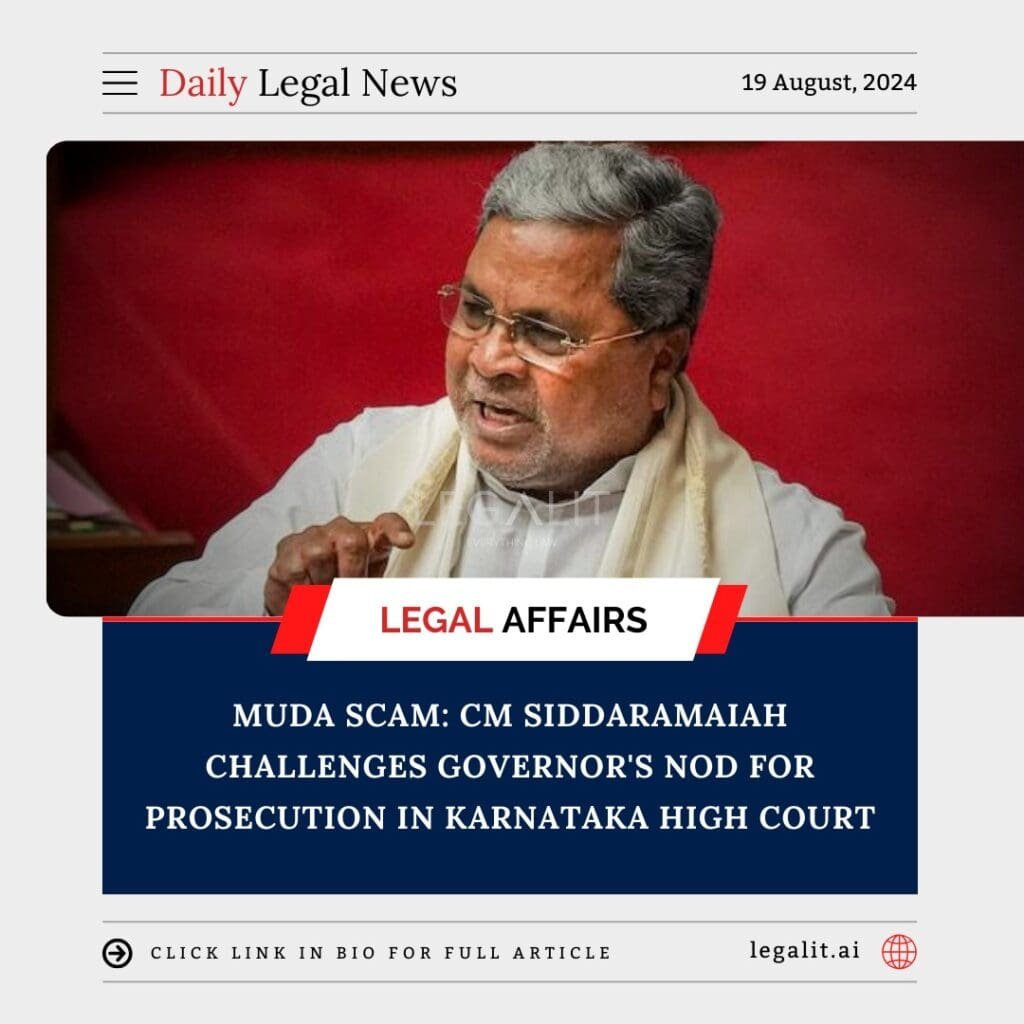
In a significant legal and political development, Karnataka Chief Minister Siddaramaiah has moved the Karnataka High Court, challenging the Governor’s decision to grant permission for his prosecution in connection with the Mysuru Urban Development Authority (MUDA) scam. The case is drawing widespread attention due to its implications for governance, the relationship between the executive and the governor, and the ongoing legal battles surrounding high-profile corruption allegations.
Background of the MUDA Scam
The MUDA scam involves allegations of irregularities in the allocation of land and the approval of various development projects under the Mysuru Urban Development Authority during Siddaramaiah’s previous tenure as Chief Minister. The allegations suggest that land parcels were allocated to ineligible beneficiaries or that undue favors were extended to certain individuals or entities in violation of established norms and regulations.
These allegations have been politically charged, with opposition parties accusing Siddaramaiah of corruption and misuse of power during his tenure. The case gained momentum when a request was made to the Governor of Karnataka to grant sanction for prosecuting Siddaramaiah, which the Governor subsequently approved.
CM Siddaramaiah’s Challenge
- Legal Grounds for the Challenge: CM Siddaramaiah has approached the Karnataka High Court to challenge the Governor’s decision to grant prosecution permission. His legal team is likely arguing that the Governor’s nod for prosecution is legally flawed or that due process was not followed in making this decision. Siddaramaiah may also contend that the charges are politically motivated and lack substantial evidence.
- Question of Authority: The challenge may raise questions about the extent of the Governor’s authority in sanctioning the prosecution of a sitting Chief Minister, particularly in cases where the allegations are perceived to be politically driven. Siddaramaiah’s petition could argue that the Governor overstepped his constitutional role or that the decision was made without proper consultation or investigation.
- Impact on Governance: Siddaramaiah’s legal action highlights the tension between the state’s executive branch and the Governor, an appointed official with certain discretionary powers. The outcome of this case could have broader implications for how such disputes are handled and the balance of power between the Governor and the state government.
Implications of the Case
The Karnataka High Court’s decision on this matter will have far-reaching implications:
- Political Repercussions: The case is highly politically sensitive, with potential ramifications for Siddaramaiah’s political career and the broader political landscape in Karnataka. A ruling against Siddaramaiah could embolden his political opponents, while a favorable ruling could strengthen his position.
- Governor’s Role and Discretion: The case could set a precedent regarding the scope of the Governor’s powers, particularly in granting prosecution sanctions against sitting members of the government. The Court’s ruling may clarify the legal boundaries and the circumstances under which such powers can be exercised.
- Judicial Oversight: The High Court’s involvement underscores the judiciary’s role in overseeing disputes between different branches of the state government. The Court’s decision will likely emphasize the need for judicial oversight in matters where there is potential for abuse of power or political manipulation.
- Public Perception of Corruption Cases: The case may influence public perceptions of how corruption allegations are handled in India, particularly when they involve high-ranking officials. The outcome could either reinforce or undermine public confidence in the legal and political systems.
Moving Forward
As the Karnataka High Court hears this case, several key developments will be closely watched:
- Court Proceedings: The arguments presented by both Siddaramaiah’s legal team and those representing the state or the Governor will be crucial in shaping the Court’s decision. The Court may examine the legal basis for the Governor’s decision and the process followed in granting the prosecution sanction.
- Legal Precedents: The Court’s ruling could reference previous cases where similar disputes between a state’s executive branch and the Governor were adjudicated, potentially setting a new precedent for how such issues are resolved.
- Political and Public Reactions: The case will continue to generate significant political and public interest, with various stakeholders likely to react based on the outcome. The ruling could have implications for upcoming elections and the political dynamics within Karnataka.
- Impact on Other Cases: The decision may also affect other ongoing or future cases involving prosecution sanctions for sitting government officials, potentially influencing how such cases are approached across India.
Conclusion
The challenge by Karnataka Chief Minister Siddaramaiah against the Governor’s sanction for his prosecution in the MUDA scam is a critical legal battle with significant political and constitutional implications. The Karnataka High Court’s ruling will not only impact Siddaramaiah’s political future but could also set important precedents regarding the powers of the Governor and the judiciary’s role in overseeing high-profile corruption cases. As the case unfolds, it will be a focal point for discussions on governance, political accountability, and the rule of law in India.